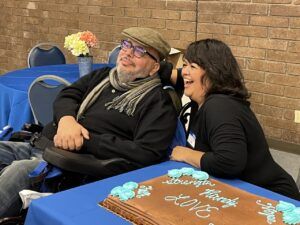
Ivy Blog
Navigating Brain Tumor Recurrence
- February 24, 2023
- Ivy Center
- Posted in Patient Support

When Randy Cordova was first diagnosed with a glioblastoma brain tumor, the news, he says, was earth-shaking. He and his wife Maura cried, prayed and committed to beating it. He quickly had surgery to remove the tumor and began radiation and chemotherapy. Six months passed and Randy and Maura felt relieved. They thought they had overcome this disease and could move on with their lives. That was until a severe headache sent Randy back to the hospital and they received the devastating news that his brain tumor had come back.

Randy went through another round of surgery and treatment to remove the small growth. He and his family had to live through the stress, worry and fear all over again. A few months later, Randy was experiencing a lack of sensation on his left side, impairing his motor skills. His doctors said it was due to treatment effect and recommended he undergo a third surgery to remove the damaged cells causing the numbness.
“This disease pulls the rug out from under you,” Maura says.
While Maura tries not to worry, she fears that the next scan or a bad headache may lead to another recurrence for Randy.
Now more than three years post-diagnosis, Randy continues to get regular brain scans every three months. He gets Avastin infusions and wears an Optune device, a wearable, portable, FDA-approved device that sends electric Tumor Treating Fields (TTFields) to tumor tissue to disrupt cancer cell division and growth.
The couple has also joined the Brain Tumor Patient & Caregiver Support Group at Barrow Neurological Institute. Maura says that being part of the group helps them focus on others and offer encouragement.
Together with their Ivy Center care team, the Cordovas are doing everything possible to prevent another brain tumor recurrence. Maura has adopted an expect-the-best attitude.
“Why can’t we expect the best? We’re worthy of good things. Let’s just expect the best. I’m tired of worrying,” she says. “If something bad happens, we let ourselves be sad for about 20 minutes, then we try to remember the good, and we’re going to keep fighting it.”
What is a brain tumor recurrence?
A recurrence is when a previously treated brain tumor begins to regrow or has come back. Even when the tumor has been resected and treatment is finished, it has a chance of returning. Tumors usually recur in the same spot as the original tumor, but it is possible for it to arise in another location of the brain or as a more aggressive grade of tumor.
“The battle is never over in patients with high-grade gliomas,” says Nader Sanai, MD, director of the Ivy Brain Tumor Center and director of Neurosurgical Oncology at Barrow Neurological Institute.
Certain types of brain tumors infiltrate normal brain tissue, often in hard-to-reach or delicate areas of the brain, making them difficult to remove. Tumor cells can be resistant to treatment and will continue to grow or regrow.
What are the chances a brain tumor will recur?
Unfortunately, there is no way to predict if and when a brain tumor will return. According to the Central Brain Tumor Registry of the United States Statistical Report, about 90 percent of patients with glioblastoma will experience a recurrence.
A 2019 study investigating tumor recurrence patterns found that within two years after primary surgery, 28 percent of patients with low-grade glioma experienced a recurrence. After two years, a recurrence was seen in 72 percent of patients. Investigators noted that recurrence patterns in these patients varied significantly.
Even patients with benign tumors are at risk of a recurrence if it’s not possible for the tumor to be completely removed.
Because some brain tumors tend to regrow, patients are often monitored after treatment and advised to get regular follow-up care and routine MRI scans.
Brain tumor recurrence symptoms
Signs and symptoms of a recurrent brain tumor can be the same symptoms experienced with the original brain tumor diagnosis, or it is possible for the patient to not have any symptoms at all. Some symptoms can feel more pronounced. Common symptoms include:
- headaches
- seizures
- drowsiness or loss of consciousness
- lack of energy
- worsening of old symptoms
If you are experiencing any of these symptoms, please contact your physician.
Treatment for a recurrence
Patients experiencing a brain tumor recurrence have experience on their side. They’ve been here before and know what to expect with surgery and treatment.
At the Ivy Center, when a tumor recurrence is suspected, the patient’s case is reviewed by our multidisciplinary tumor board to determine the best, most personalized treatment plan. It’s important to differentiate between a true tumor recurrence and treatment effect from therapy, such as pseudoprogression, radionecrosis and inflammatory changes. Pseudoprogression is the appearance of tumor growth, followed by a decrease in tumor size as the tumor positively responds to treatment. Pseudoprogression can occur shortly after treatment is complete. Radionecrosis, resulting from radiation treatment, is the permanent death of brain tissue and can be mistaken for tumor recurrence. Most cases of radionecrosis appear within a year or two of treatment.
The course of treatment you receive for a recurrence might be similar to your initial treatment, depending on where the tumor has grown back. Surgery is an option but not always the direction your care team will recommend for a recurrence. Radiation and chemotherapy will also be considered. Drugs to help with the symptoms of the brain tumor, such as anti-seizure medication and steroids to reduce inflammation in the brain, may be advised.
Brain tumor clinical trials
Often enrolling in a clinical trial testing an experimental therapy will be an avenue of treatment for a recurrence. In an Ivy Center clinical trial, a patient takes a drug matched to the genetic composition of their tumor. During surgery to remove the tumor, tissue samples are collected and within days researchers will determine if the drug reached the tumor and had the intended effect. If it did, the patient can continue on that drug after surgery. If the drug didn’t work as expected, the patient can move on to another clinical trial without losing time.
The Ivy Center is currently screening patients for clinical trials testing promising new therapies and drug-device combinations for a variety of brain tumors. Contact an Ivy Navigator to learn if you may be eligible, or click here to complete a short trial eligibility form.
Even if your tumor has not recurred, it’s important to be aware of the options available to you should a recurrence happen. Speak with an Ivy Navigator today to discuss developing a proactive treatment plan by calling 602-406-8605 or emailing [email protected].
You are not alone in your recurrence
A recurrence can cause feelings of shock, anger and fear. Those with recurrent brain tumors are not alone. Find support for yourself and your family. There are support groups for those experiencing a recurrence, where others who have walked the same path offer support and guidance. The Gray Matters Foundation is a nonprofit organization created to support and empower brain tumor patients and their loved ones.
Medically reviewed by Kelly Braun, MD, Clinical Neuro-Oncologist at the Ivy Brain Tumor Center
This story is for general health information only and is not meant to be used as medical advice, diagnosis or treatment. Please consult your physician or healthcare provider before beginning any treatment protocol or with any questions. This story reflects the health status of this particular patient at the time the story was written and photographs were taken. The patient’s condition may have changed over time.
